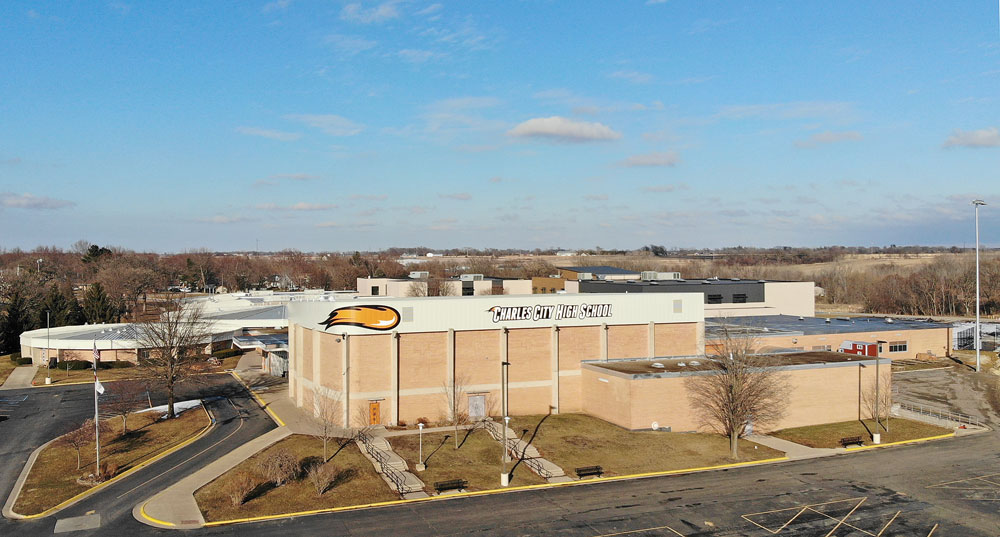County, state candidates agree on need for hog confinement dialogue
By Chris Baldus | cbaldus@charlescitypress.com
Farm animals? Yes, they do stink. It’s a fact of life in Iowa, the nation’s leading producer of pork.
The stench that can arise from confined animal feeding operations, as well as potential for water pollution are issues that have wafted into the Floyd County Board of Supervisors meetings through the years. And Tuesday night supervisor as well as state office candidates were asked at a forum at Trinity United Methodist Church in Charles City what they thought specifically of hog confinements.
Incumbent Supervisor Roy Schwickerath, the Democratic nominee for the post who is being challenged by Republican Linda Tjaden, said hog confinement siting issues have come up more than once in the past three and a half years — his first term. The board, limited by state law to only reviewing hog confinement site applications and making recommendations to the Iowa Department of Natural Resources has approved of some and disapproved of others, which led the facility developers to make changes to get the county’s nod.
The Iowa DNR does not have to follow a county board’s recommendation and approval is based on an evaluative process called the master matrix. The application is scored on aspects of the facility and practices it uses.
Schwickerath said the matrix is not solving problems that it should.
“The thing that came to light out of the (hog confinement projects) that I’ve seen is that the matrix really needs a good work over,” he said. “It doesn’t address the problems that happen out there today.”
Professionals help those in the hog confinement industry find “loopholes” in the matrix that allows industry members to “do things that aren’t always good neighborly things,” Schwickerath said.
“We do live in an ag community and we don’t want to lose site of that,” he said. “Without that, where would we be? But we do need to revisit the matrix.”
To the question, Tjaden began, “I’m a farmer. And I understand there are issues that people have with the hog confinements.”
She agreed with Schwickerath that the matrix needs to be “looked at,” bud didn’t want to lose site of the value the ag industry brings to “our land.”
“We have livestock,” she said. “We have had them and yes they do smell … But what it is is it’s a great way of living.
“The hog confinements, I guess, I don’t have a problem with them if they are following the rules that are in place, or the guideline. And I do believe that a lot of the farmers that are putting them up right now, I think they are taking that avid step also to try to do what they can to be good neighbors.”
State office candidates seemed open to discussing the master matrix issue.
“Our job at the Legislature is to find a balance,” Rep Todd Prichard, D-Charles City, said. “Iowa leads the nation in pork production. We need to continue to do that. We need to have a strong ag economy, but at the same time we need to balance that with our quality of life.”
He described driving down Highway 35 to Ames over the weekend at “pretty stinky” a lot of the way.
“I would entertain something to be done to (rework) the matrix,” he said, noting the need to discuss distance requirements of facilities from communities.
Prichard’s challenger, Stacie Stokes, R-Rockford, said: “First of all, we do live in Iowa. So I acknowledge that and agriculture is a huge part of Iowa. And also, I do believe that we can work together to find a solution and that’s the key, only when we work together can we find a good solution for all. So I definitely would … take a look at all those that have an investment in it and work on a plan for everyone.”
Republican Waylon Brown, who is running against incumbent Sen. Mary Jo Wilhelm, D-Cresco, said small farmers’ need to expand operations must be taken into account in any discussion about the matrix.
“So being a farmer and growing up raising hogs my whole life … I bring a different perspective to that,” he said. “I agree with Mr. Prichard that the matrix is something to look at. And as we continue to develop a policy that is going to work well for everybody in the state, we also need to keep in mind there’s lots of small family farms that they don’t have the luxury of being able to move to another location to expand their operation. So we need to keep that in mind that those small operations do need to be able to expand their operations because at the end of the day they are trying to raise their families and trying to put food on their family’s table also.”
Wilhelm said agricultural and environmental concerns need to be balanced, but that is going to take opening a dialogue.
“We haven’t had a conversation about those issues for a long time,” she said.
Water quality, quality of life and confined animal feeding operation’s needs should be part of the discussion, she said.
“Isn’t conversation and communication and education the way to go?” she asked. “You can’t address a situation unless you first start … with talking.”
— 20161020 —









Social Share